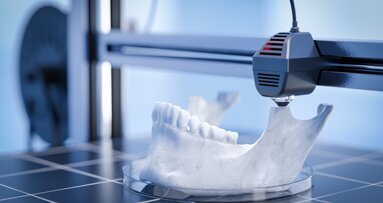DURHAM, N.C., U.S.: In a recent study, researchers from Duke University in Durham have found that the walking speed of 45-year-olds can reveal a considerable amount about their teeth, lungs, immune system and brains. In the five-decadelong cohort study, researchers collected data from nearly 1,000 participants from the age of 3 in order to establish whether they could find corresponding neurocognitive data to indicate who would become slow walkers later in life and what this might mean in regard to general health.
Gait speed is usually used to measure the health of older patients, and this recent study has shown that there are biomarkers that may indicate the health and well-being of patients from a much earlier age.
According to the researchers, the neurocognitive testing that the study’s participants undertook at age 3 included an IQ test and tests of language understanding, frustration tolerance, motor skills and emotional control. This testing proved very good at predicting who would become a slower walker later in life. Over the course of five decades, participants of the study were then tested 13 times. The last round of data collection took place between April 2017 and April 2019. From the data gathered, the researchers were able to show that the slower walkers had signs of accelerated aging when it came to aspects like teeth, lungs and immune system compared with the people who walked faster.
“The thing that’s really striking is that this is in 45-year-old people, not the geriatric patients who are usually assessed with such measures,” said lead researcher Dr. Line J.H. Rasmussen, a postdoctoral researcher at Duke University’s Department of Psychology and Neuroscience.
In addition, MRI scans that were taken toward the end of the study showed that the slower walkers tended to have lower total brain volume, lower mean cortical thickness, less brain surface area and a higher incidence of white matter hyperintensities.
The researchers acknowledged that lifestyle choices may have caused some of the differences in health and cognition, but said that they believed that the study still provided valuable biomarkers to see who was likely to do better health-wise later in life.
The study, titled “Association of neurocognitive and physical function with gait speed in midlife,” was published on Oct. 11, 2019, in JAMA Network Open.
Tags:
TAIPEI, Taiwan: Conventional periodontal therapies, while effective to a degree, often fall short of fully restoring the complex architecture and function ...
AMMAN, Jordan: As artificial intelligence continues to expand its role in healthcare, large language models such as ChatGPT are increasingly being used to ...
LONDON, UK: Though elite athletes generally possess an enviable level of physical fitness, a recent study has shown that their oral health may leave much to...
BRISTOL, UK: The importance of mother’s milk to an infant’s development is now well established. In a recent study, researchers analysed the fossilised ...
BELÉM, Brazil: Television can often play a key role in determining what foods people purchase, thanks to its high concentration of food product ...
HELSINKI, Finland: Scientists have previously identified obesity and increasing age as risk factors for gestational diabetes mellitus (GDM). Some scholars ...
WARSAW, Poland: There has long been a debate around what constitutes excessive time spent on devices and the adverse health effects of this. In a new study ...
YEREVAN, Armenia: While the digitisation of dentistry continues to progress steadily throughout regions with highly advanced capitalist economies, a book ...
CHAMPIONSGATE, Fla., U.S.: In the interest of public health, the International Academy of Oral Medicine and Toxicology (IAOMT) has published a new research ...
SYDNEY, Australia: The underlying causes of central sensitisation disorders such as migraine and fibromyalgia are poorly understood. The gut–brain axis ...
Live webinar
Tue. 3 March 2026
11:00 am EST (New York)
Dr. Omar Lugo Cirujano Maxilofacial
Live webinar
Tue. 3 March 2026
8:00 pm EST (New York)
Dr. Vasiliki Maseli DDS, MS, EdM
Live webinar
Wed. 4 March 2026
12:00 pm EST (New York)
Munther Sulieman LDS RCS (Eng) BDS (Lond) MSc PhD
Live webinar
Wed. 4 March 2026
1:00 pm EST (New York)
Live webinar
Fri. 6 March 2026
3:00 am EST (New York)
Live webinar
Tue. 10 March 2026
4:00 am EST (New York)
Assoc. Prof. Aaron Davis, Prof. Sarah Baker
Live webinar
Tue. 10 March 2026
8:00 pm EST (New York)
Dr. Vasiliki Maseli DDS, MS, EdM



 Austria / Österreich
Austria / Österreich
 Bosnia and Herzegovina / Босна и Херцеговина
Bosnia and Herzegovina / Босна и Херцеговина
 Bulgaria / България
Bulgaria / България
 Croatia / Hrvatska
Croatia / Hrvatska
 Czech Republic & Slovakia / Česká republika & Slovensko
Czech Republic & Slovakia / Česká republika & Slovensko
 France / France
France / France
 Germany / Deutschland
Germany / Deutschland
 Greece / ΕΛΛΑΔΑ
Greece / ΕΛΛΑΔΑ
 Hungary / Hungary
Hungary / Hungary
 Italy / Italia
Italy / Italia
 Netherlands / Nederland
Netherlands / Nederland
 Nordic / Nordic
Nordic / Nordic
 Poland / Polska
Poland / Polska
 Portugal / Portugal
Portugal / Portugal
 Romania & Moldova / România & Moldova
Romania & Moldova / România & Moldova
 Slovenia / Slovenija
Slovenia / Slovenija
 Serbia & Montenegro / Србија и Црна Гора
Serbia & Montenegro / Србија и Црна Гора
 Spain / España
Spain / España
 Switzerland / Schweiz
Switzerland / Schweiz
 Turkey / Türkiye
Turkey / Türkiye
 UK & Ireland / UK & Ireland
UK & Ireland / UK & Ireland
 Brazil / Brasil
Brazil / Brasil
 Canada / Canada
Canada / Canada
 Latin America / Latinoamérica
Latin America / Latinoamérica
 USA / USA
USA / USA
 China / 中国
China / 中国
 India / भारत गणराज्य
India / भारत गणराज्य
 Pakistan / Pākistān
Pakistan / Pākistān
 Vietnam / Việt Nam
Vietnam / Việt Nam
 ASEAN / ASEAN
ASEAN / ASEAN
 Israel / מְדִינַת יִשְׂרָאֵל
Israel / מְדִינַת יִשְׂרָאֵל
 Algeria, Morocco & Tunisia / الجزائر والمغرب وتونس
Algeria, Morocco & Tunisia / الجزائر والمغرب وتونس
 Middle East / Middle East
Middle East / Middle East











































To post a reply please login or register